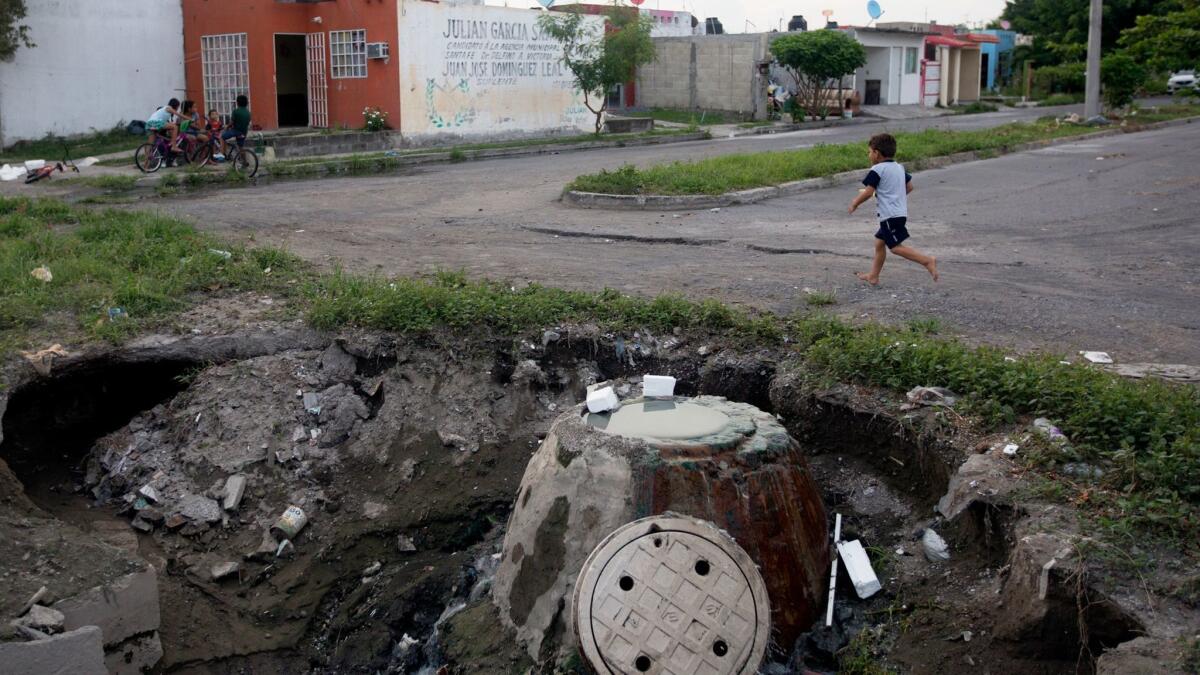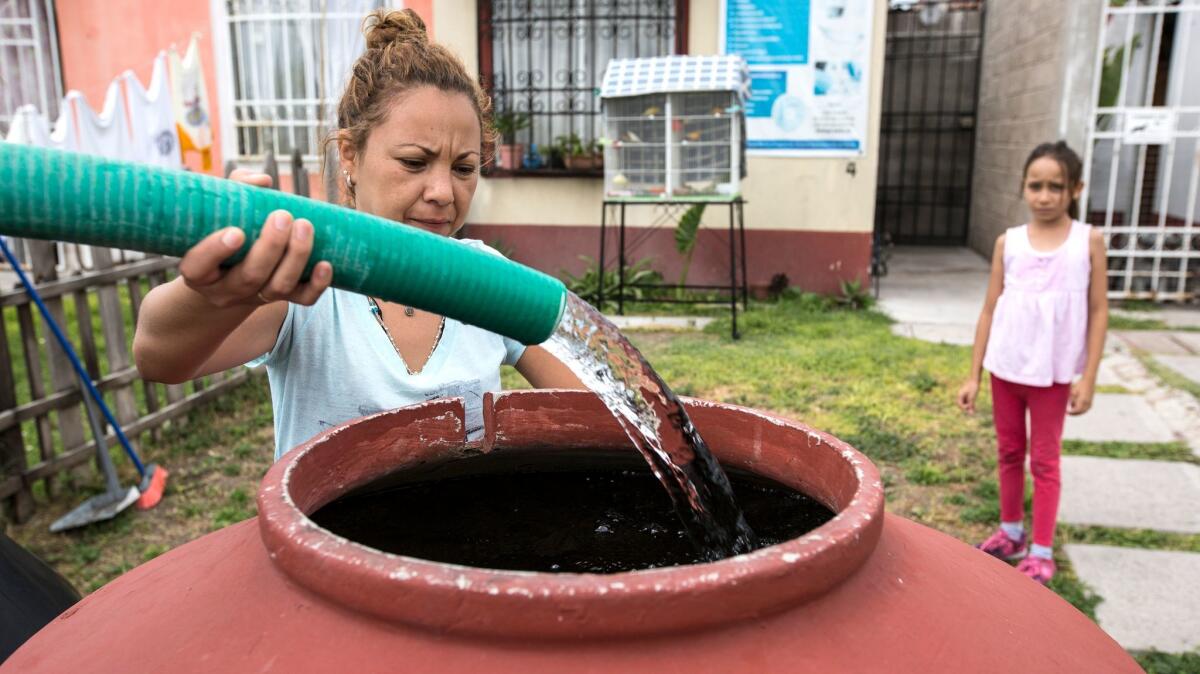Mexico’s Homex faces accusations of a massive fraud from the SEC, but the case has stalled

The U.S. Securities and Exchange Commission filed civil fraud charges in October against former executives of Homex, a Mexican construction company that was once the country’s largest builder of affordable housing.
It accused the four executives of faking the sales of more than 100,000 homes to boost revenues by $3.3 billion — a fraud that, if proved, is believed to be the biggest in Mexican history.
But the case appears to have run aground because the agency hasn’t been able to deliver a summons to the executives, according to court documents filed in San Diego federal court.
The procedural roadblock is the latest twist in a scandal that has roiled Mexico for years — part of the fallout from a massive, government-backed housing program whose collapse was detailed in a Times series in November.
Billions of dollars remain unaccounted for, and working-class homeowners are stranded in decaying developments all over the country.
The alleged fraud cost Mexican taxpayers and foreign investors as much as $1 billion and has inspired awestruck commentary on the vast scheme, which was allegedly hatched by the company’s former CEO, Gerardo de Nicolas.
“A magician never existed, that so captivated the masses … with such a fateful trick,” wrote Alejandro Sicarios, a columnist for the Noroeste newspaper in the western state of Sinaloa.
But while Homex continues to generate outrage from residents and some in the media, the Mexican government and housing industry have looked the other way.
It’s bad for business, bad for the economy and bad for the country.
— Thomas Gorman, a former SEC attorney, on how Mexico suffers because of a lack of accountability
The executives and the company have thus far avoided any serious sanctions, and there is no evidence that Mexican authorities are investigating any possible criminal wrongdoing.
The SEC, meanwhile, has been stymied because the four executives named in the complaint have not approved a waiver allowing their representatives or attorneys to accept the summons on their behalf. The SEC must now arrange delivery of the summons to the executives in Mexico, a complex process governed by the Hague Convention that could take several months, according to the SEC.
Homex did not respond to requests for comment from the executives, who resigned last year.
In a separate SEC case filed against the company in March 2017, Homex reached a settlement without admitting or denying wrongdoing and agreed to a five-year ban from U.S. stock markets. Mexico’s National Banking and Securities Commission fined the company $1.2 million.
Coming amid growing public demands for corruption crackdowns and the arrests of some top politicians, legal experts and critics say the stalled case illustrates how powerful business figures in Mexico remain insulated from consequences.
The lack of accountability contributes to Mexico’s relatively low ranking for foreign investment, scaring off investors who know their funds can be wiped out. Among the biggest losers are housing developers trying to raise capital to address the country’s dire housing shortage.
“It’s bad for business, bad for the economy and bad for the country,” said Thomas Gorman, a former SEC attorney who is now a partner at a Washington-based law firm.
Jose Shabot, a developer of affordable housing based in Mexico City, said the Homex case and other housing-related scandals have limited access to the deep pools of money from foreign investment banks and private equity firms.
“When I talk with investors when these things happen, there’s lots of distrust of the industry in Mexico,” said Shabot, whose firm, Quiero Casa, builds about 1,500 apartment homes annually. “It’s been hard for new companies to build a reputation and grow.”
Homex was once flush with Wall Street money as it teamed with the Mexican government to build affordable housing developments across the country.
But by the early part of this decade, the company was floundering as thousands of residents began abandoning the developments, many of which were poorly built and left with substandard infrastructure.
The company had been embraced by presidents and World Bank officials as a company that could help solve the world’s housing shortages.
De Nicolas, a mild-mannered 48-year-old with a background in engineering, was the public face of the company. He traveled often to New York, where he dazzled investors and analysts with his technical expertise.
“He was refreshingly entrepreneurial. … He broke down the process of building a home to a science,” said one analyst who asked not to be identified because of employer rules barring contacts with media. “He could detail the exact materials needed for a day’s job, down to how many cinder blocks and nails.”
But the technical wizardry was an illusion, according to the SEC complaints.
Back in Sinaloa at Homex’s corporate headquarters, De Nicolas was running the company with two sets of books, the SEC alleged, one showing “actual” sales for internal use, and the other called “accounting” for disclosures to Wall Street.
The books were doctored in such detail that the fake revenues were accompanied with fake expenses, the SEC said. Tens of thousands of phantom sales were manually entered every year into financial statements.
Evidence of the alleged deception was visible from space.
The company had reported selling hundreds of homes at a development in the state of Guanajuato from 2010 to 2012, but a satellite photo taken in 2012 showed that it hadn’t even broken ground, according to the SEC complaint.
The allegedly false accounting deceived sophisticated institutional investors who had about $1 billion in bond holdings. Many shareholders who relied on the phony data also lost money when Homex fell into bankruptcy in 2014, wiping out about $600 million in shareholder equity.

Among the biggest losers were Bank of America and Pacific Investment Management Company, or Pimco, the Newport Beach-based bond giant. Mexican banks also lost as much as $7 billion, the victims of a related Ponzi-like scheme, according to the SEC.
The World Bank, which extended a credit line to the company in 2012 through its development branch, the International Finance Corp., lost about $55 million when the company went bankrupt, according to bankruptcy filings.
It declined to comment on its Homex investment.
Other alleged victims aren’t eager to lament their losses either, at least not publicly. No large investors agreed to interview requests. Mexican banks have not commented publicly, nor have Mexico’s housing-financing agency, Infonavit, which lost $20 million, or Mexico’s development bank, which lost $54 million.
One possible explanation for the silence is that institutional investors are avoiding publicity that could embarrass them and raise questions about their investment strategies, experts say.
There is considerable investor wrath, however. Shareholders have filed lawsuits, and experts say it was likely a U.S. investor’s complaint that triggered the SEC investigation. The SEC declined to comment.
The SEC’s case against the executives details a fraud so remarkable that it’s on a par with Bernie Madoff’s ponzi scheme, said James Spindler, a University of Texas law professor who has represented foreign companies seeking listings on U.S. stock exchanges.
Such a case, he said, would likely result in criminal prosecutions in the U.S. Though it may go nowhere in Mexico, the inaction has fallout.
“When you have a brazen fraud like this and very few consequences for people involved, then investors have to question whether that’s a good place to put their money in the future,” Spindler said.
Homex’s dealings were long suspect but came under scrutiny only after they came to the attention of regulators outside Mexico. The few other cases against business figures in Mexico in recent years also came about because of pressure from outside the country.
Fernando Martinez de Velasco, a Mexico City-based attorney who specializes in financial crimes, compared Mexico’s handling of white-collar criminals to the way it deals with drug cartel suspects, saying Mexican authorities act only under pressure from the U.S.
“It’s in the U.S. where they get all the drug traffickers,” he said. “Here nothing happens.”
Twitter: @richmarosi
More to Read
Start your day right
Sign up for Essential California for news, features and recommendations from the L.A. Times and beyond in your inbox six days a week.
You may occasionally receive promotional content from the Los Angeles Times.







